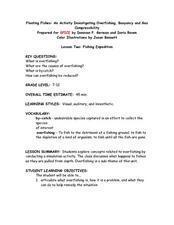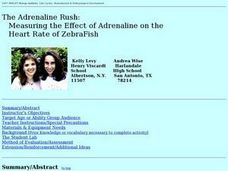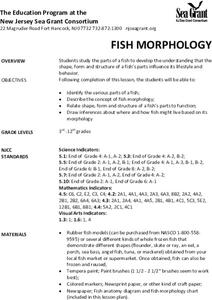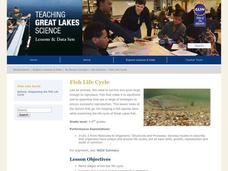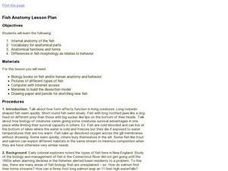Curated OER
Fish Drawing
For this fish coloring worksheet students examine a realistic detailed drawing of a fish. Students color the picture, which does not have word labels.
Curated OER
Trout Cookies
Students explore the external anatomy of a fish. In this anatomy and adaptations lesson, students look at an image of a trout and identify its various external features including fins, eyes, spots, parr marks and lateral line. Students...
Curated OER
Fish Identification Skills
Students describe the roles of various organisms in the same environment. They study fish based on thier behavior and features. In addition, they identify fish based on specific characteristics.
Curated OER
"Fish: Anatomy and Diversity in the Chesapeake Bay"
Students explore a variety of basic fish body form and their functions. They differentiate between different species of fish found in the Chesapeake Bay and St. Mary's River. In addition, they match pictures with descriptions using...
California Academy of Science
Fish Forms
I've said it before, and I'll say it again, you can add art to any lesson! While little learners are discovering why fish have specific body parts such as, scales, fins, and gills, they start making three-dimensional fish forms. Children...
Keeping a Betta
Swim with the fishes. Class members observe, research, and record physical characteristics of Betta fish. They change the environment of the aquarium by adding rocks and plants and observe any reactions the fish have to the new environment.
Curated OER
Adaptations of Fishes for Survival in Polar Environments
Students compare the anatomy of temperature and polar fishes. They explore the adverse effects of cold on metabolism and physiology and discuss how polar fishes adapt to their environments. Comparisons are also made to the DNA sequences...
Curated OER
Floating Fishes: Fishing Expedition
A referenced PowerPoint is not included, but this instructional activity can still make an impact with emerging environmentalists. After introducing them to the facts about overfishing, they experiment with a fishing simulation using...
Curated OER
Fish Anatomy
In this fish worksheet, students label the parts of a fish on a diagram and then describe the function of some of the anatomical parts of the fish. This worksheet has 11 fill in the blank and 5 short answer questions.
Curated OER
Animal Movement in Water
Students explore oceanography by participating in field trip activities. In this fish characteristics lesson, students attend a trip to a local beach or reservoir and collect different specimens in order to examine them. Students...
Curated OER
Fishes
In this fish worksheet, students will use fish characteristics vocabulary words to fill in the blanks of 3 statements and a crossword puzzle.
Curated OER
Measuring the Effect of Adrenaline on the Heart Rate of Zebra Fish
Students investigate the heart beat of zebra fish in timed intervals. They record the heart beats and average three counts to display in their data tables. They repeat these steps increasing the adrenaline solution.
Curated OER
Fun With Fish Forms
Students explore fish adaptations and anatomy. In this science lesson, students discuss various adaptations of fish and how those adaptations help them.
Curated OER
Fish Parasite Survey
Students count nematodes, cestodes and crustaceans on approximately one-hundred and fifty fish. They fill out autopsy reports for external and internal parasites then complete and discuss guide questions to make inferences about parasite...
Curated OER
Fish Morphology
Students identify the various parts of a fish. They describe the concept of fish morphology and relate shape, form and structure of a fish's parts to function.
Michigan Sea Grant
Fish Life Cycle
Fish are no different when it comes to a living being's primary objective—to reproduce. They do differ, including from fish species to fish species, in their life cycles, survival tactics and reproductive strategies. After discussion of...
Curated OER
What Do Fish Look Like?
In this fish worksheet, 2nd graders study the characteristics associated with all fish. Students use the words all, most, and some with the given fact about fish and what they have in common for classification.
Howard Hughes Medical Institute
Vertebrate Circulatorium
When you get to the heart of the matter, you learn a lot about an organism by studying its circulatory system! A perfect resource for a zoology or anatomy class, the simulation gives users a peek inside a variety of vertebrates to...
Biology Junction
Amphibians
Biologists know of more than 2,300 living species of amphibians. Learn more about the four orders of amphibians with an interesting presentation. It explains the similarities and differences between the thousands of species of...
Curated OER
Fishy Behavior
Here's a lab that may make you rethink that morning cup of coffee. Biology scholars test the effects of caffeine, alcohol, and nicotine on the behavior of zebrafish through an intriguing experiment. Learners observe fish behavior before...
Curated OER
Fish Anatomy
Young scholars identify and interpret the internal anatomy of the fish. They also identify and define vocabulary for anatomical parts and anatomical functions and forms. Finally, students identify and interpret the differences in fish...
American Museum of Natural History
Anatomy Adventure
Sometimes science is puzzling. Using an online animation, individuals manipulate skeletal bones of an ancient species to recreate its skeleton. Learners complete the skeletal puzzle and learn about the process of paleontology in person...
Curated OER
Rainbow Trout
Students investigate the many varieties of both tropical and freshwater fish, and find out about the anatomy of these creatures. They explore biodiversity in bodies of water, including information about coral reefs, and study the effects...









